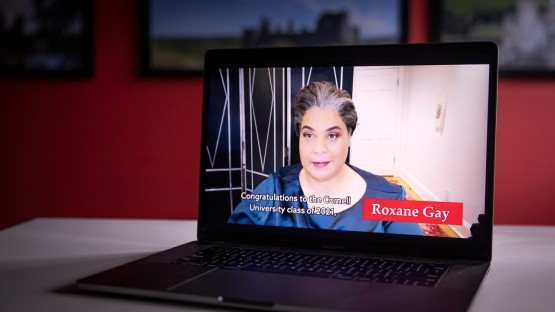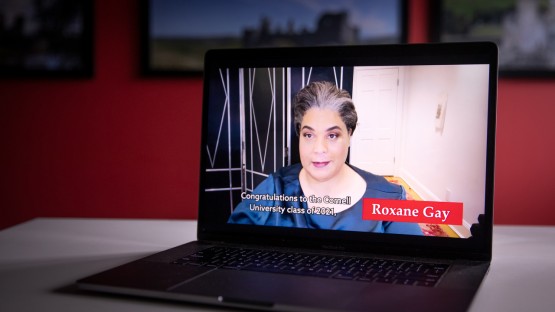
Take chances, ignore the naysayers and, instead of pulling up the ladder after you’ve made the climb, lend a hand to those on the lower rungs.
In a recorded Convocation address, author and social commentator Roxane Gay challenged the Cornell Class of 2021 to be true to themselves and to their dreams, however wild they may be.
“As you walk into the unknown of the rest of your life, please tear down the borders around your imagination and what you believe is possible for yourself and for your community,” Gay said. “Do not let the fears and insecurities of others keep you from your ambitions for a remarkable life.”
Gay, a New York Times contributing opinion writer and visiting professor at Yale University, is the author of “Bad Feminist” (2014), the New York Times bestselling essay collection, as well as the 2014 novel “An Untamed State” and her 2017 memoir, “Hunger: A Memoir of (My) Body.” She recently began her own publishing imprint, Roxane Gay Books, with publisher Grove Atlantic.
Gay’s address to the senior class touched on her childhood; on her determination to be a writer in the face of constant rejection and doubts; on the realities of “a flawed and unjust world” that rewards the mediocrity of the majority and punishes the marginalized; and on her hopes for the graduating class.
The recorded event, which will be available to the public on CornellCast in June, began with a reading from Laurence Minter ’21 of his poem, “History is Ours”:
“Farewell to the hill, look how far we’ve come / From the analyst to the actor, the future doctors to the diplomats / The engineers to the athletes, tell your story wherever you go,” he read.
Minter’s reading was followed by welcoming remarks from President Martha E. Pollack, after which Convocation Committee Chair Hassaan Bin Sabir ’21 gave the class address. He broke with tradition, however, and gave his speech alongside fellow committee members Sarah Brice ’21 and Gloria Oladipo ’21, who also spoke.
“Here’s why: I just don’t think I know more about life than the rest of you,” Bin Sabir said. “I’m 22, and I’m still figuring it all out. But most importantly, if there’s any lesson I’ve learned over the last four years, and over the pandemic in particular, it’s that I need other people to sustain me, to make me more human … and to get me through the every day. We all do.”
Gay began her remarks by recalling her lifelong desire to be a writer, even when encouragement and validation were in short supply.
“There was a time, in my 20s and 30s, where rejection was constant,” she said. “And that rejection wasn’t an opening. It did not make me a better person. It made me salty, mostly. It also made me work harder.”
As a child, she and her brothers would create imaginary worlds, she said, digging holes in an adjacent empty lot and connecting them with ravines so they could visit one another. They also spent hours exploring the abandoned appliances and car parts in a nearby patch of woods. Her imagination and love of storytelling was born in those worlds.
“Adults never interfered with these magical places,” she said. “There were no rules. I took that carefree energy to my writing; the borders of my imagination expanded.”
Like many, she said, she has been changed by trauma. But she did not dwell on those things. “Bad things happened to all of us,” she said. “And I don’t say that to minimize my trauma or anyone else’s. Instead, I say that to mean we are all more than our suffering.”
In her youth, she said, if little else was reliable, writing always was. Her parents encouraged her to consider a career as a doctor, lawyer or engineer – what she called “the Haitian career trifecta.” But after some starts and stops in college, writing eventually won out.
“No matter what I had going on, I wrote and I read and I wrote and I read,” she said. “I made the time to write whether I was in high school or college or grad school, working an overnight shift in a video store, or as a bartender … I was able to honor this commitment to my craft because writing was, and is, my true north.”
Since 2014, when her essay collection and novel put her on the literary map, she has been “living a dream I did not even know I had,” she said. “The dream I thought I had was to write a book worthy of being published. The dream was for a few people to read and maybe love that book. I did not dare to dream of anything more than that.”
While her literary dreams were small at first (“It is hard for modest expectations to be disappointed, and so I kept my expectations incredibly modest”), she encourages others to be bold in their aspirations.
“My students often talk about how their parents disapprove of their desires to major in creative or other supposedly impractical fields. I can’t stand it,” she said. “As a writer, I often see people discouraging new writers by cataloging every single challenge they might face … It makes me wonder why they are trying to pull up the ladder they climbed.”
She closed with words of advice.
“Be fiercely committed and fiercely kind,” she said. “Be relentless. Find your true north – that thing that makes your world make sense. Always follow your true north, wherever it may lead.”








